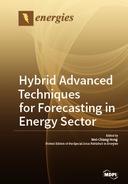Explore

Hybrid Advanced Techniques for Forecasting in Energy Sector
0 Ungluers have
Faved this Work
Login to Fave
Accurate forecasting performance in the energy sector is a primary factor in the modern restructured power market, accomplished by any novel advanced hybrid techniques. Particularly in the Big Data era, forecasting models are always based on a complex function combination, and energy data are always complicated by factors such as seasonality, cyclicity, fluctuation, dynamic nonlinearity, and so on. To comprehensively address this issue, it is insufficient to concentrate only on simply hybridizing evolutionary algorithms with each other, or on hybridizing evolutionary algorithms with chaotic mapping, quantum computing, recurrent and seasonal mechanisms, and fuzzy inference theory in order to determine suitable parameters for an existing model. It is necessary to also consider hybridizing or combining two or more existing models (e.g., neuro-fuzzy model, BPNN-fuzzy model, seasonal support vector regression–chaotic quantum particle swarm optimization (SSVR-CQPSO), etc.). These advanced novel hybrid techniques can provide more satisfactory energy forecasting performances.This book aimed to attract researchers with an interest in the research areas described above. Specifically, we were interested in contributions towards recent developments, i.e., hybridizing or combining any advanced techniques in energy forecasting, with the superior capabilities over the traditional forecasting approaches, with the ability to overcome some embedded drawbacks, and with the very superiority to achieve significant improved forecasting accuracy.
This book is included in DOAB.
Why read this book? Have your say.
You must be logged in to comment.
Rights Information
Are you the author or publisher of this work? If so, you can claim it as yours by registering as an Unglue.it rights holder.Downloads
This work has been downloaded 215 times via unglue.it ebook links.
- 115 - pdf (CC BY-NC-ND) at Unglue.it.
Keywords
- Artificial Neural Networks
- autoregressive moving average with exogenous variable (ARMAX)
- Bayesian inference
- cluster validity
- Computer science
- Computing & information technology
- energy forecasting
- evolutionary algorithms
- fuzzy group
- hybrid models
- principal component analysis
- quantile forecasting
- quantum computing mechanism
- support vector regression / support vector machines
- thema EDItEUR::U Computing and Information Technology::UY Computer science
Links
DOI: 10.3390/books978-3-03897-291-4Editions


